- Our Work /
- UNMC Online Faculty Assessment
Online Faculty Assessment
This self-assessment for online teaching will allow faculty/staff to evaluate and reflect upon your competencies in key areas of online teaching and provide a baseline of pedagogical, technical, and administrative skills.
As part of final results, the faculty member can receive additional guidance/resources for each competency to better prepare staff for the online teaching environment.
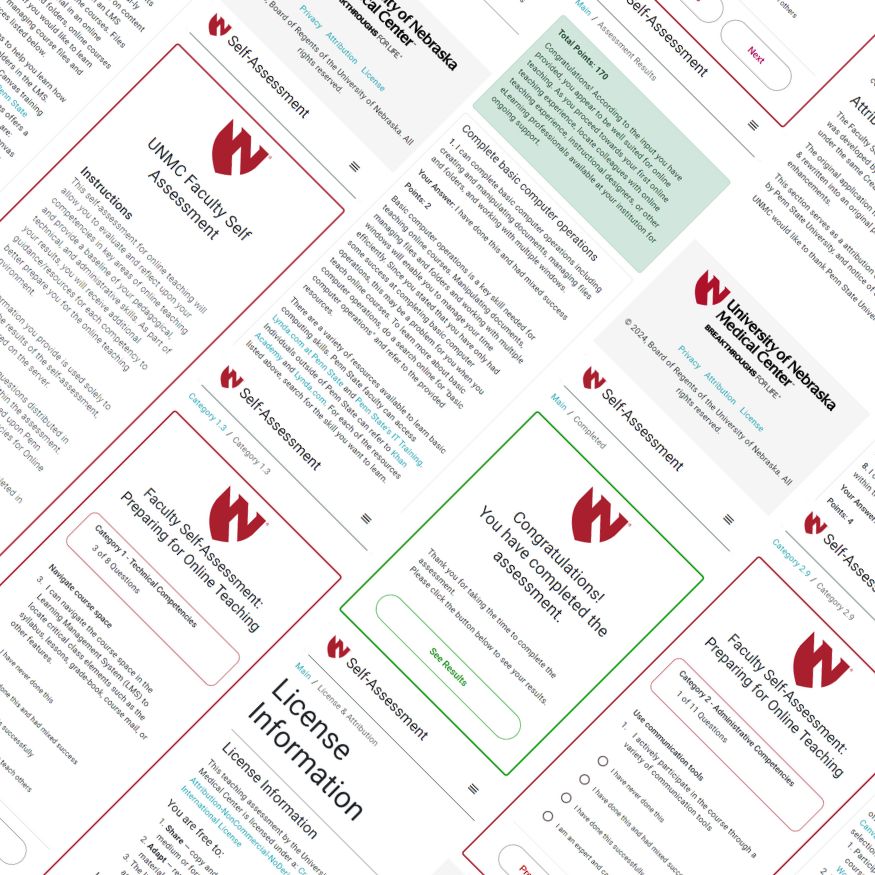
The self-assessment for online teaching will allow you to evaluate and reflect upon your competencies in key areas of online teaching and provide a baseline of your pedagogical, technical, and administrative skills. As part of your results, you will receive additional guidance/resources for each competency to better prepare you for the online teaching environment.
Project Design UI/UX Image CDN Cloud Hosted Analytics PWA E-mail
Angular Angular PWA Material Angular Bootstrap Azure Static Web Apps Azure Communication Services Asp.NET Azure API Gateway
Online Education in Higher Education
The evolving landscape of digital teaching and learning tools supporting faculty success
Key Definitions
Online Learning
Education that takes place over the Internet. It is often referred to as "e-learning" or "distance learning" and can be entirely remote or blended with in-person instruction.
Learning Management System (LMS)
Software application for the administration, documentation, tracking, reporting, and delivery of educational courses, training programs, or learning and development programs.
Faculty Self-Assessment
A reflective process where educators evaluate their own teaching practices, knowledge, and skills in various competency areas to identify strengths and opportunities for growth.
Pedagogical Competency
The knowledge and skills related to teaching methods, learning theories, instructional design, and assessment strategies that contribute to effective educational practices.
Synchronous Learning
Learning that happens in real-time, with students and instructors interacting simultaneously through video conferencing, live chat, or virtual classrooms.
Asynchronous Learning
Learning that occurs on the student's schedule, with materials, assignments, and discussions available for access at any time and not requiring simultaneous participation.
Faculty Adoption of Online Education Tools
Trends in Faculty Adoption
Higher education has witnessed a significant increase in faculty adoption of online teaching tools and methodologies, accelerated by global events and changing student expectations. Faculty are increasingly incorporating digital tools across various aspects of their teaching practice:
- Content Delivery: Using multimedia, interactive modules, and recorded lectures
- Student Engagement: Implementing discussion forums, collaborative tools, and interactive assessments
- Assessment: Adopting online testing, automated grading, and digital feedback systems
- Accessibility: Ensuring course materials meet accessibility standards for diverse learners
- Data Analytics: Utilizing learning analytics to track student progress and improve teaching methods
"Faculty who regularly use online education tools report higher student engagement, improved learning outcomes, and greater teaching efficiency compared to traditional methods alone."
Benefits of Regular Tool Usage
Flexibility
Accommodate diverse teaching and learning styles
Scale
Reach more students effectively
Efficiency
Automate administrative tasks
Personalization
Tailor learning experiences
Faculty Self-Assessment Importance
Self-assessment tools like UNMC's Faculty Assessment allow educators to:
- Identify knowledge gaps in digital pedagogy
- Receive personalized professional development recommendations
- Track growth in online teaching competencies over time
- Build confidence in technology integration
- Connect with targeted resources based on specific needs
Ready to enhance your online teaching skills?
Complete the UNMC Online Faculty Assessment to receive personalized recommendations and resources tailored to your specific teaching context.
Project Deliverables
This project required a collaboration between UNMC staff, COPH, instructional designers, graphic artists, web developers, and key stakeholders.
The COPH Faculty Assessment project delivered a functional and tested web application tool for self-assessment.
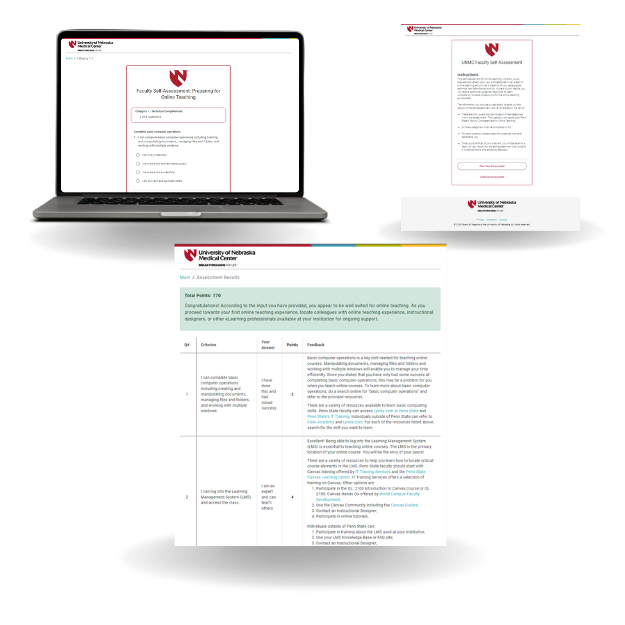
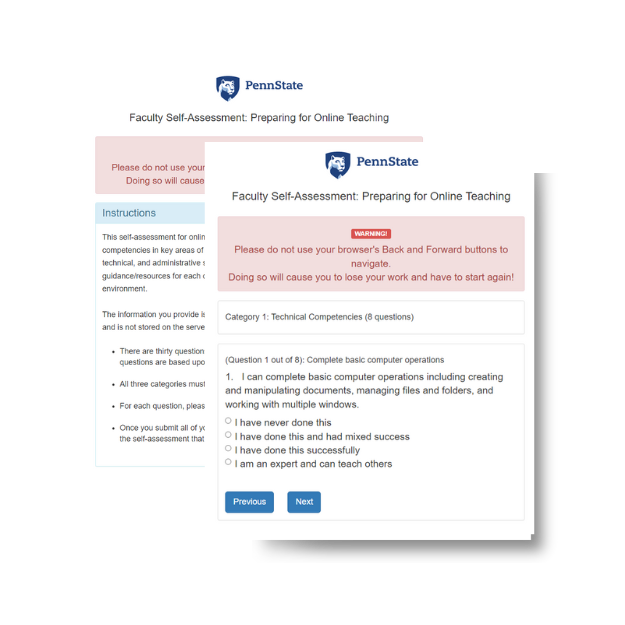
Source Material
Manage a project that was an open source solution and convert it to a supportable & sustainable branded resources for UNMC using the industry best practices.
Design Documents
Manage a project that was an open source solution and convert it to a supportable & sustainable branded resources for UNMC using the industry best practices.
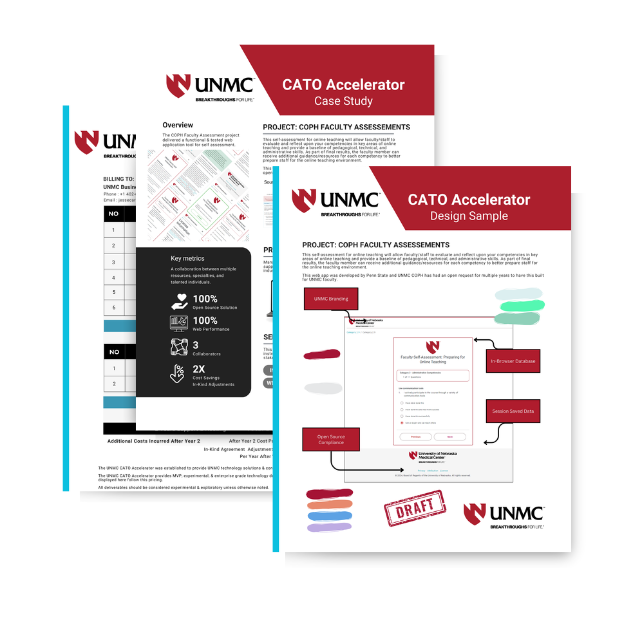
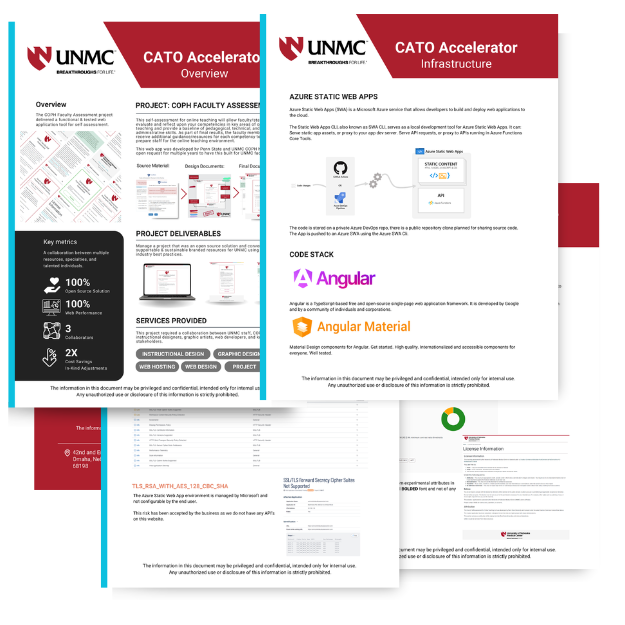
Final PWA / Web App
Manage a project that was an open source solution and convert it to a supportable & sustainable branded resources for UNMC using the industry best practices.
